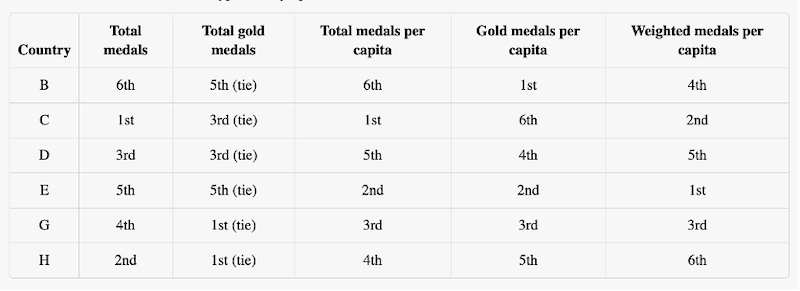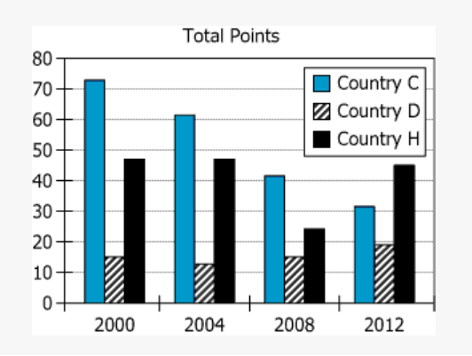题库 / EAOfficialPractice-MSR-92
Discussion
Ahmed, Farida, Tala, and Yousef are debating how to measure Summer Olympics achievement by countries.
- Ahmed maintains that the best measure of overall Olympic achievement by a country is the most straightforward: a simple count of all medals won by that country.
- Farida observes that more populous countries have more potential Olympic athletes and argues that a fair measure of overall Olympic achievement must in some way include consideration of a country’s population.
- Tala argues that the only real Olympic achievement by an athlete is victory. Gold medals (for first place) should be counted; silver and bronze medals (for second and third place, respectively) should not.
- Yousef recommends counting each silver medal as half a gold medal, and each bronze medal as half a silver medal.
Rankings Table
The table ranks 6 countries by various measures of their achievement in the 2008 Summer Olympics, with a ranking of 1st indicating greatest achievement and 6th indicating least achievement. The rankings compare the 6 countries only to each other, not to other competing nations. The weighted medals per capita measure counts each gold medal as equal to 2 silver medals and 4 bronze medals. There are no other types of Olympic medal.

Graph
With respect to a particular measure of Olympic success by the countries listed in the Rankings Table, the graph shows total numbers of points won by Countries C, D, and H in each Summer Olympics from 2000 through 2012. Each country gets 4 points for each gold medal, 2 points for each silver medal, and 1 point for each bronze medal. Countries B, E, and G each consistently had lower point totals than Country D.

Suppose that the participants in the Discussion are aware of the information given in the table and the graph. Which of the following statements about the relative achievement in the 2008 Summer Olympics of the six countries referred to in the table and graph is most clearly supported?
(A)Ahmed would agree that Country C had the greatest achievement.
Farida would agree that Country B had the greatest achievement.
Tala would agree that Country E had the greatest achievement.
Yousef would agree that Country C had the greatest achievement.
Yousef would agree that Country E had the greatest achievement.